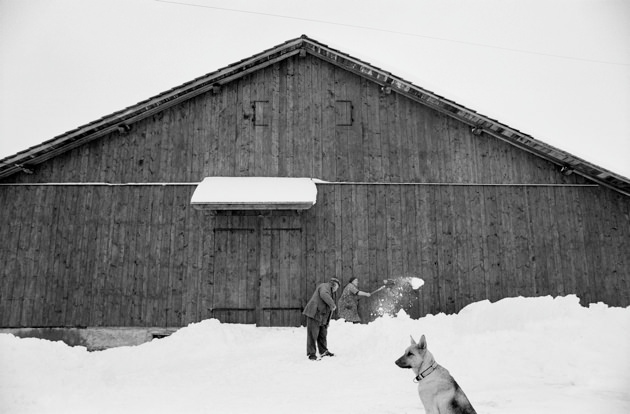“Everyone who thinks is unhappy,” says Sergei Dovlatov in one of his stories. Some crows caw all day, some have nothing to say. I see one of them pace back and forth on my lawn the way I’ve seen Hamlet do on stage. Whatever is bothering him seems insoluble, too much for one crow to figure out on his own. Still, no harm trying, I suppose, even with the racket his relatives are making as they fly to and fro, as if the road they oversee is not covered only with fallen leaves and patches of ice, but also with fresh road kill.
My late father, who had something good to say about most things, used to console people who complained about bitter cold weather by reminding them of the joys of a hot bowl of soup and of a strong drink being made permissible early in the day by the extraordinary circumstances. In addition, he claimed that the cold concentrates the mind. The moment we step outdoors, we do what we have to do with uncommon intelligence and dispatch, unlike those folks who can afford to sit in the shade on some Mediterranean or Caribbean island. Once we lie down, time ceases to count and we can meditate on eternity, Cioran believed. History, he said, is the product of people who stand up and get busy. Can one be a dreamer or a dolt on the North Pole? My father had his doubts about that. How does Berlioz sound at forty below? How does Schumann? He never cared to find out.
If only Plato and Socrates had to scrape the ice off their windshields and deal with dead car batteries, I was going to add, when the horrifying realization struck me that, despite our interminable New Hampshire winters and our supposedly heightened state of intelligence, we’ve never of late up here produced one philosopher that anyone would care to remember. So, this uncanny feeling that I have, when I get up in the middle of the night and tiptoe on bare feet down to the cold kitchen to peek at the thermometer outside, that I’m on the verge of a supreme insight, something worthy of Blaise Pascal contemplating the silence of the infinite universe, turns out to be all hooey. Well, perhaps not entirely: the one whose mind is clear senses himself free, a master of his destiny. Who says philosophy is incompatible with hard labor of self-preservation? When I’m shoveling snow off the roof I sneak admiring glances at myself as if I were Nietzsche’s superman.
Still, I can’t help but feel that I’m surrounded by deep thinkers: the young cow standing puzzled in a field covered with first snow; the mutt I’ve been calling Schopenhauer, sighing at the end of his heavy chain, or the other one who reminds me of Karl Marx and who I saw bark at the police in their cruiser as they drove past his house. Even the lake about to freeze appears mute with indecision and lost in thought. As for cats, there must be at least a couple of Wittgensteins slinking around back porches in the vicinity and one large, long-haired black tabby who comes to rub himself against my leg now and then and whom I’ve named after Boethius, who wrote Consolation of Philosophy, one of the most popular books in Medieval Europe.
“No philosopher has ever influenced the attitudes of even the street he lived on,” Voltaire was reputed to have said. That’s not what I believe. With deep winter upon us and the weather growing colder, even the wood smoke out of the neighbors’ chimneys could be described as philosophizing. I can see it move its lips as it rises, telling the indifferent sky about our loneliness, the torment of our minds and passions which we keep secret from each other, and the wonder and pain of our mortality and of our eventual vanishing from this earth. It’s a kind of deep, cathedral-like quiet that precedes a snowfall. One looks with amazement at the bare trees, the gray daylight making its slow retreat across the bare fields, and inevitably recalls that Emily Dickinson poem in which she speaks of just such a winter afternoon—windless and cold, when an otherworldly light falls and shadows hold their breath—and of the hurt that it gives us for which we can find no scar, only a closer peek inside ourselves where the meanings and all the unanswered questions are.



